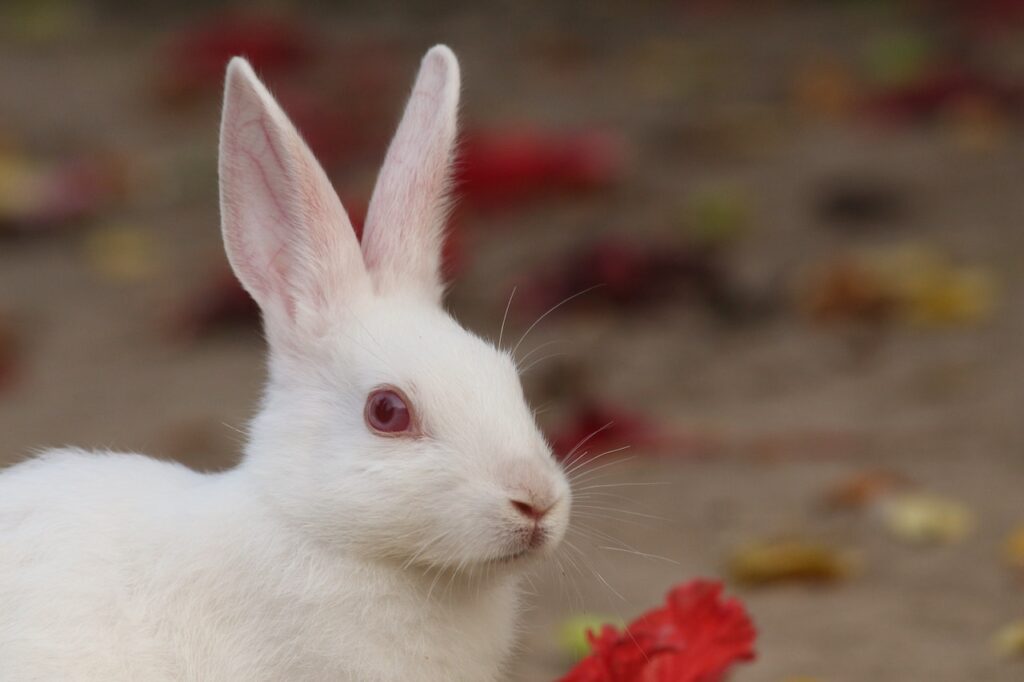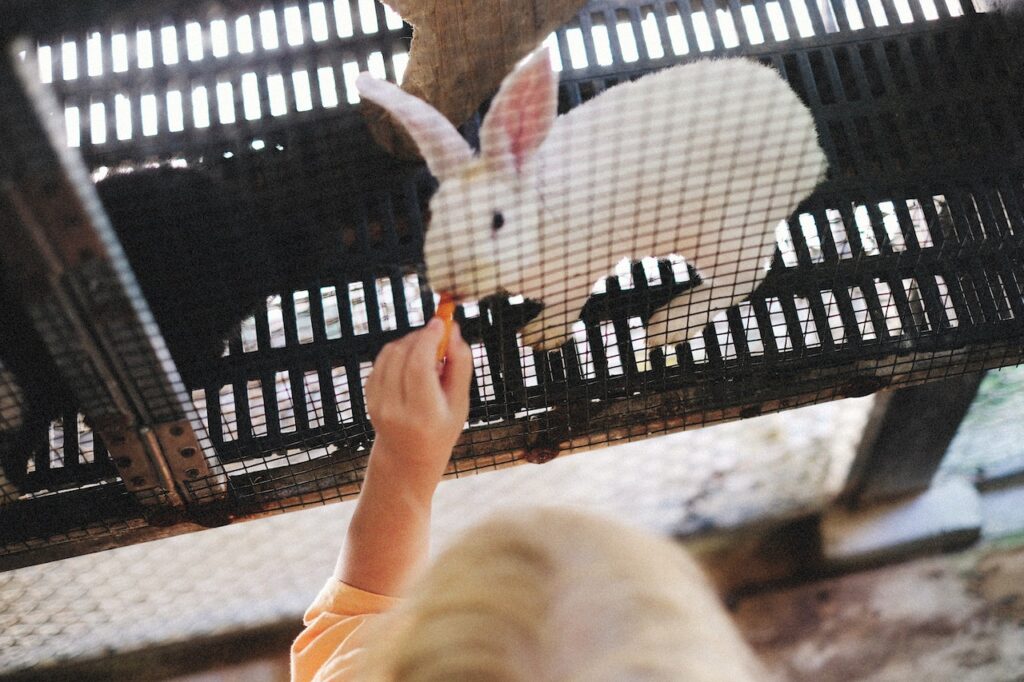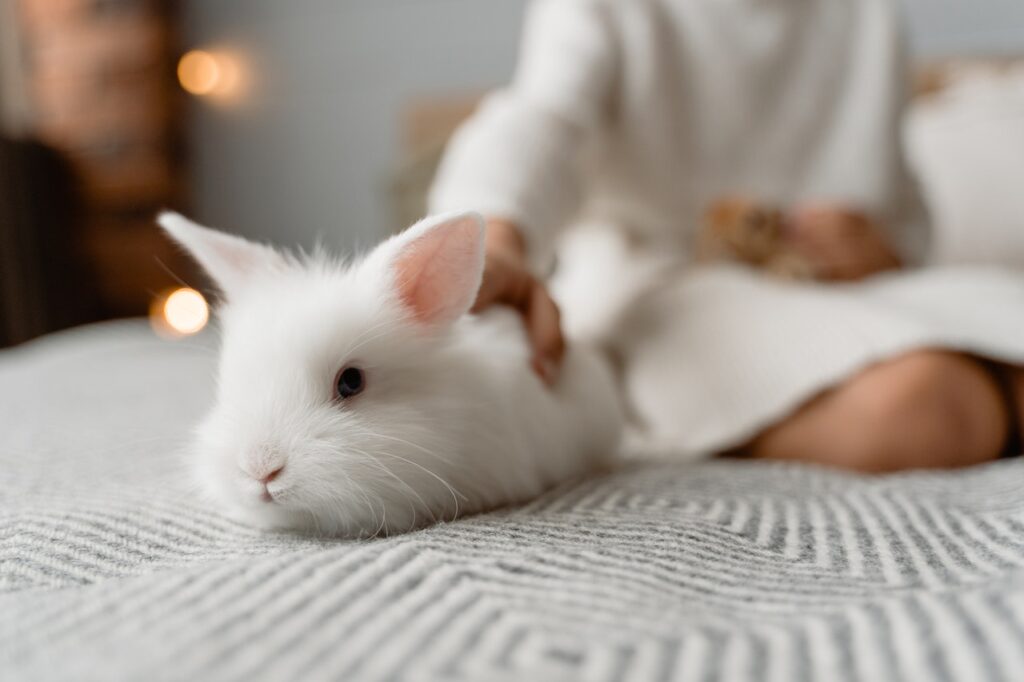Learn everything about the White rabbit: breeds, facts, traits, health and care is a symphony of unexpected adventures and delightful discoveries. Whether you are considering adopting a furry friend or are an existing rabbit enthusiast, this comprehensive guide will help you navigate the rabbit warren, from understanding the various breeds to appreciating their unique traits, addressing health concerns and providing optimal care.
Table of Contents
Introduction: The Joy of White Rabbits
What’s the first image that springs to your mind when you think of a white rabbit? Perhaps it’s Alice’s tardy companion in Wonderland or maybe a magician’s favorite trick. Either way, the world of white rabbits is full of wonder, variety, and enjoyment. But there’s more to these adorable creatures than meets the eye. Are you ready to hop into the rabbit hole?
White Rabbit: Breeds, Facts, Traits, Health and Care
White rabbits are not a monolithic breed but a vibrant assortment of various breeds, each with their unique charm and characteristics. Their care and health management also differ. Let’s explore some notable white rabbit breeds, their facts, traits, and how to care for their health.
Understanding White Bunnies Breeds
There are over a dozen breeds of rabbits that can be predominantly white. Some of these include the Florida White, the New Zealand White, and the Dwarf Hotot. The Florida White is a compact breed known for its round body, whereas the New Zealand White is a larger breed, often used in laboratories due to its calm demeanor. The Dwarf Hotot, in contrast, is a small breed, distinctive for its eye ‘makeup’ – a black band around its eyes.
Unraveling the Facts About White Rabbits
Do white rabbits have red eyes? Well, some do. The color of a rabbit’s eyes is influenced by a genetic trait known as albinism. Albinos have a lack of pigmentation, giving their fur a white hue and their eyes a reddish appearance due to visible blood vessels.
Another interesting fact is that white rabbits are not always born white. Many rabbit breeds, like the Florida White, change their fur color as they age, starting with a darker fur at birth that gradually turns white.
Exploring the Traits of White Rabbits
White bunnies are more than just their beautiful, snowy coats. Each breed has distinctive traits that set them apart, contributing to their charm and personality. Let’s delve into these fascinating characteristics that make white rabbits such unique pets.
The Beautiful Coat
The white coat of these rabbits isn’t just visually appealing; it also serves a practical purpose. In the wild, this color aids in camouflage against snowy landscapes. In captivity, this striking white coat may need regular grooming to keep it clean and shiny, depending on the breed.
The Diverse Eye Colors
Contrary to popular belief, not all white rabbits have red eyes. While many do possess ruby eyes due to a lack of pigmentation, some white rabbits have blue or brown eyes. Breeds like the Himalayan rabbit have a unique gene that gives them dark-colored eyes, contrasting beautifully with their white fur.
Different Sizes
White rabbits come in various sizes, from the compact Polish and Dwarf Hotot to the larger New Zealand White and Californian. The size of a white rabbit can influence its care needs, activity level, and even its lifespan.
The Variation in Lifespan
White bunnies, depending on their breed and care, can live from 5 to 10 years, or even longer. Smaller breeds often have a longer lifespan compared to larger ones. Proper care, diet, and regular vet visits can contribute to a rabbit’s longevity.
The Range in Temperament
From the gentle and laid-back Florida White to the active and inquisitive Polish rabbit, white rabbits exhibit a wide range of temperaments. Some are calm and easygoing, making them perfect for families and first-time rabbit owners. Others are lively and playful, ideal for those who can provide plenty of interaction and stimulation.
Distinctive Markings
While the term “white rabbits” conjures images of pure white fur, some white rabbit breeds do have unique markings. For example, the Dwarf Hotot is known for its ‘eyeliner’ – a black ring of fur that surrounds their eyes, giving them a distinctive and adorable appearance.
Addressing Health Concerns of White Rabbits
White rabbits, like all rabbit breeds, are prone to some specific health issues. These include dental problems, obesity, and susceptibility to certain infections. Regular vet check-ups, a balanced diet, and adequate exercise can help keep these health issues at bay.
Providing Optimal Care for Your White Rabbit
Proper care for your white bunny includes a balanced diet, plenty of exercise, and social interaction. A healthy diet consists of hay, pellets, fruits, and vegetables. Encourage exercise with playtime and exploration, and make sure to spend quality time with your pet rabbit to fulfill its social needs.

A Closer Look at White Rabbit Breeds
When it comes to white rabbit breeds, there’s quite the smorgasbord to choose from. Let’s dive deeper into some of the most popular white rabbit breeds.
The Elegant Florida White
Compact, round, and cute to boot – that’s the Florida White for you. Bred primarily for laboratory use due to their manageable size, these rabbits have become increasingly popular as pets because of their adaptable nature.
Traits and Personality of Florida White
Florida Whites are known for their calm, gentle nature. They’re not overly energetic, making them a good choice for first-time rabbit owners. They’re also quite friendly, making them excellent pets for families with children.
Health and Care for Florida White
While Florida Whites are generally healthy, they are susceptible to the common health issues of rabbits. Regular veterinary check-ups, a healthy diet, and proper grooming are essential to their wellbeing.
The Calm New Zealand White
New Zealand Whites are large, docile creatures with a muscular build. These rabbits are often used in laboratories and meat production due to their size, but they also make for great pets due to their docile nature.
Traits and Personality of New Zealand White
New Zealand Whites are renowned for their calm, friendly disposition. They’re not known for their agility or playfulness, but their placid demeanor makes them great companions.
Health and Care for New Zealand White
As with most rabbits, a diet high in fiber, regular exercise, and regular vet check-ups are essential for New Zealand Whites.
The Eye-Catching Dwarf Hotot
Dwarf Hotots are renowned for their “eye makeup” – a black band of fur that encircles their eyes. This small breed is often sought after as a pet due to its adorable appearance and lively personality.
Traits and Personality of Dwarf Hotot
Dwarf Hotots are energetic and playful, often amusing their owners with their antics. They’re social creatures and require plenty of interaction to remain happy and healthy.
Health and Care for Dwarf Hotot
Dwarf Hotots have similar health concerns to other rabbit breeds. Regular dental check-ups are vital, as dental issues can become serious if not addressed promptly.
The Regal Himalayan Rabbit
Often compared to the Siamese cats due to their unique color points, the Himalayan rabbits are one of the oldest and most distinguished rabbit breeds. Their serene nature and manageable size make them favored pets worldwide.
Distinctive Traits and Personality of Himalayan Rabbit
Himalayans are known for their calm and patient temperament, making them an ideal pet for families and those looking for a gentle companion. They are also famous for their ‘pose’ – lying flat on a surface, stretching their bodies out, a trait not commonly seen in other breeds.
Health and Care Considerations for Himalayan Rabbit
Similar to other rabbit breeds, Himalayans require a balanced diet, ample exercise, and regular vet check-ups to stay healthy. Their white fur needs regular grooming to keep it clean and shiny.
The Striking Californian Rabbit
Californian rabbits, often confused with the Himalayan due to their similar fur coloration, are a large breed developed in California in the 1920s. These rabbits are popular both as pets and show animals because of their striking appearance and friendly nature.
Traits and Personality of Californian Rabbit
Californian rabbits are known for their laid-back and friendly nature. They are sociable animals, comfortable around humans and other pets, making them suitable for families.
Health and Care Aspects for Californian Rabbit
Californians, like all rabbits, need a balanced diet, plenty of exercise, and regular vet check-ups. They have a dense coat that requires regular grooming, especially during the molting season.
The Elegant Polish Rabbit
Don’t let the name fool you; Polish rabbits aren’t from Poland. This compact, small breed has a charming disposition and an energetic personality.
Traits and Personality of Polish Rabbit
Polish rabbits are known for their active and inquisitive nature. They love to explore their surroundings and are always up for a play session, making them a joy to have around.
Health and Care Requirements for Polish Rabbit
While Polish rabbits are generally healthy, they do need regular exercise to keep them active and prevent obesity. A well-balanced diet and regular grooming to prevent furballs are other essential aspects of their care.
Taking Care of Your White Rabbit
In addition to understanding the breeds, it’s also crucial to know how to provide optimal care for your white rabbit. This includes understanding their diet, exercise needs, grooming requirements, and ensuring their overall wellbeing.
Feeding Your White Bunny
A balanced diet is fundamental for a rabbit’s health and longevity. Their diet should mainly consist of hay, complemented by a smaller portion of fresh greens, fruits, and high-quality rabbit pellets. Always make sure your rabbit has access to fresh, clean water.
Exercise and Playtime
White rabbits, regardless of their breed, require regular exercise to maintain a healthy weight and a happy disposition. A safe space for them to hop around, explore, and play is vital. Toys can be an excellent addition to stimulate their curiosity and keep them active.
Health Check-ups
Regular health check-ups are crucial in early detection and treatment of potential health issues. A yearly vet visit is recommended for general wellness, but more frequent visits may be necessary based on your rabbit’s age and health condition.
Grooming Your White Rabbit
Rabbits are naturally clean animals and can groom themselves. However, they can benefit from regular brushing to remove loose fur and prevent hairballs. Some breeds might also need occasional nail trims.
Social Interaction
Rabbits are social animals and require interaction to remain happy and healthy. Spending time with your rabbit, petting them, and talking to them can help strengthen your bond.

Feeding White Rabbits: Essential Nutrients for a Balanced Diet
White rabbits, like all rabbits, have specific dietary requirements to keep them healthy and active. Understanding what to feed your white rabbit can make a significant difference in their wellbeing. Let’s examine what constitutes a balanced diet for a white bunny.
Hay, The Main Staple
Hay should make up about 70% of your white rabbit’s diet. This fibrous food keeps their digestive system working correctly and helps grind down their ever-growing teeth. Timothy hay is generally the best option, but other varieties like orchard and oat hay can be included for variety.
A Helping of Fresh Vegetables
Rabbits love fresh veggies! Leafy greens such as kale, spinach, and romaine lettuce should make up a large portion of their vegetable intake. Other vegetables like bell peppers, zucchini, and broccoli can also be included. However, remember to introduce new veggies slowly to avoid upsetting your rabbit’s stomach.
Fruits as Treats
Fruits are like candy for rabbits – tasty but should be given sparingly. Apples, bananas, and berries can be given in small quantities as occasional treats. Remember to remove any seeds or pits as they can be harmful to rabbits.
Rabbit Pellets for Extra Nutrients
Rabbit pellets provide additional nutrients that may not be covered by hay and vegetables alone. Choose high-quality pellets that are high in fiber and avoid mixes with seeds, nuts, or corn, which are hard for rabbits to digest.
Plenty of Fresh Water
Lastly, your white rabbit should always have access to fresh, clean water. Change the water daily to ensure it’s free from bacteria and contaminants.
Feeding White Rabbits for Optimal Health
Proper nutrition plays a crucial role in the White rabbit: breeds, facts, traits, health, and care. By providing a balanced diet comprising mainly hay, supplemented with fresh vegetables, occasional fruit treats, and high-quality rabbit pellets, you can ensure your white rabbit maintains optimal health. Always ensure they have access to fresh water and remember, every rabbit is unique, so dietary needs may vary from rabbit to rabbit.
Health of White Rabbits: Common Concerns and Prevention
Like any pet, white rabbits are susceptible to a range of health issues. Understanding these common concerns and how to prevent them can significantly contribute to the wellbeing of your white rabbit.
Dental Problems
Rabbits have continually growing teeth, and without proper care, they can develop dental issues like overgrown teeth. Provide plenty of hay to naturally grind down their teeth and consider regular vet check-ups to catch any dental problems early.
Gastrointestinal Stasis (GI Stasis)
This is a potentially deadly condition where a rabbit’s digestive system slows down or stops completely. Prevent it by providing a high-fiber diet (mainly hay) and ensuring your rabbit gets plenty of exercise.
Flystrike
This is a condition where flies lay eggs on the rabbit, and the hatched maggots start eating the rabbit’s flesh. It’s a severe and often fatal condition, most common in the warmer months. Keep your rabbit’s living area clean, check them daily for cleanliness, and consider using a preventative treatment during the high-risk period.
Snuffles (Pasteurellosis)
Snuffles is a respiratory infection caused by bacteria. Symptoms include sneezing, runny nose, and watery eyes. Good hygiene, a clean habitat, and a balanced diet can help prevent this condition. If your rabbit shows any symptoms, contact a vet immediately.
Obesity
White rabbits, particularly those who are less active, can be prone to obesity. This can lead to several health issues, including heart disease and arthritis. Ensure your rabbit has a healthy diet and gets plenty of exercise to maintain a healthy weight.
Ensuring the Health of Your White Rabbit
Keeping an eye on the health of your white rabbit is an integral part of White rabbit: breeds, facts, traits, health, and care. By understanding the common health concerns and taking proactive steps to prevent them, you can provide your white rabbit with a healthy, happy, and fulfilling life.
Are White Rabbits Hypoallergenic?
When it comes to pets and allergies, it’s a common misconception that some breeds, regardless of the species, are entirely hypoallergenic. This belief is unfortunately not entirely accurate, and it holds true for white rabbits as well.
Rabbits, including white rabbits, are not considered hypoallergenic. People who are allergic to rabbits react to a specific protein found in the rabbit’s dander (dead skin cells), urine, or saliva, not the fur itself. This protein is present in all rabbit breeds, including white rabbits.
However, the severity of allergic reactions can vary significantly from one person to another. Some individuals may have mild symptoms, while others might experience severe allergic reactions.
If you’re considering adopting a white rabbit but have known allergies or sensitivity, it might be a good idea to spend time around rabbits first, if possible, to see how your body reacts. Additionally, seeking advice from a healthcare professional or an allergist would be beneficial.
FAQs about White Rabbits
Why are some white rabbits born with red eyes?
This is due to albinism, a genetic trait that causes a lack of pigmentation. Albino rabbits have white fur and red eyes due to the visible blood vessels.
Are white rabbits friendly?
Generally, yes. Most white rabbit breeds are known for their docile, friendly nature. However, individual temperaments may vary.
What are some health issues white rabbits face?
White rabbits can experience health issues like dental problems, obesity, and susceptibility to certain infections. Regular vet check-ups can help identify and address these issues.
What do white rabbits eat?
A balanced diet for a rabbit includes hay, pellets, and a variety of fruits and vegetables. It’s essential to monitor their diet to prevent obesity.
How often should white rabbits exercise?
Daily exercise is vital for all rabbit breeds. This could include hopping around the house, playing with toys, or exploring a safe outdoor area.
How long do white rabbits live?
With proper care and nutrition, white rabbits can live between 5-10 years, sometimes even longer. Regular vet visits are essential to ensure your rabbit’s longevity.
Conclusion: The Wonderful World of White Rabbits
The world of White rabbit: breeds, facts, traits, health and care is both enchanting and diverse. Understanding your rabbit’s breed characteristics, addressing health concerns, and providing optimal care can ensure a fulfilling, happy life for your pet. Whether it’s the compact Florida White, the calm New Zealand White, or the charming Dwarf Hotot, each breed of white rabbit offers a unique blend of companionship and delight.

